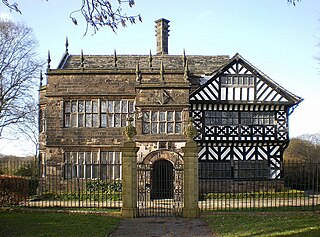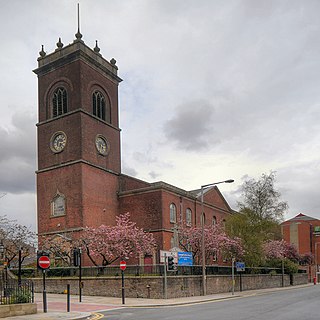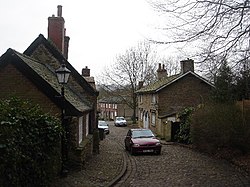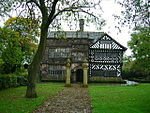
Bolton is a town in Greater Manchester in North West England, formerly a part of Lancashire. Close to the West Pennine Moors, Bolton is 10 miles (16 km) north-west of Manchester and lies between Manchester, Darwen, Blackburn, Chorley, Bury and Salford. It is surrounded by several neighbouring towns and villages that together form the Metropolitan Borough of Bolton, of which Bolton is the administrative centre.

Xaverian College is a Roman Catholic college in Manchester, England, two miles south of the city centre in Rusholme. Established in 1862, Xaverian College has become one of the most oversubscribed Sixth form college in Greater Manchester, along with Loreto College and Ashton Sixth Form College. It consistently ranks in the top 10 facilities for 16-18 education. Xaverian College is a member of the Association of Colleges. As of 2019, the acceptance rate is 30%.

Smithills Hall is a Grade I listed manor house, and a scheduled monument in Smithills, Bolton, Greater Manchester, England. It stands on the slopes of the West Pennine Moors above Bolton at a height of 500 feet, three miles north west of the town centre. It occupies a defensive site near the Astley and Raveden Brooks. One of the oldest manor houses in the north west of England, its oldest parts, including the great hall, date from the 15th century and it has been since been altered and extended particularly the west part. Parts of it were moated. The property is owned by Bolton Metropolitan Borough Council and open to the public.

Chowbent Chapel is an active Unitarian place of worship in Atherton, Greater Manchester, England. It was built in 1721 and is the oldest place of worship in the town. It is a member of the General Assembly of Unitarian and Free Christian Churches, the umbrella organisation for British Unitarians. The chapel was granted Grade II* Listed status in 1966.

Hall i' th' Wood is an early 16th-century manor house in Bolton in the historic county of Lancashire and the ceremonial county of Greater Manchester, England. It is a Grade I listed building and is currently used as a museum by Bolton Metropolitan Borough Council. It was the manor house for the moiety of the Tonge with Haulgh township held by the Brownlows in the 16th century. The original building is timber framed and has a stone flagged roof; there were later additions to the house, built from stone, in 1591 and 1648. The name represents "Hall in the Wood' spoken in the local regional English dialect and is pronounced.

10 Firwood Fold is a 16th-century house in Bolton, Greater Manchester, England. It is a Grade I listed building and was the birthplace of English inventor Samuel Crompton in 1753.

The Church of St George, Bolton, is a redundant church in Bolton, Greater Manchester, England. It was designated a Grade II* listed building on 26 April 1974. It was completed in 1796 and had a shallow chancel and south chapel added or rebuilt 1907 by James Simpson. It closed in 1975, and is now a crafts centre.

The Church of St Mary the Virgin, Deane, is an Anglican parish church in Deane, Bolton, Greater Manchester, England. It is a member of Deane deanery in the archdeaconry of Bolton, diocese of Manchester. It is a Grade II* listed building.

St Thomas' Church is in Eskrick Street, Halliwell, a residential area of Bolton, Greater Manchester, England. It is an active Anglican parish church in the deanery of Bolton, the archdeaconry of Bolton, and the diocese of Manchester. Its benefice is united with those of five other local churches to form the Benefice of West Bolton. The church is recorded in the National Heritage List for England as a designated Grade II* listed building.

Holy Trinity Church, Bolton is a redundant Church of England parish church in Trinity Street, Bolton, Greater Manchester, England. It a Grade II listed building. It was a Commissioners' church, having received a grant towards its construction from the Church Building Commission.

Sacred Heart Church is a Grade II listed redundant Roman Catholic church on Tyldesley Road, Hindsford, Atherton in Greater Manchester, England. It has been designated by English Heritage as a Grade II listed building.

There are 48 Grade I listed buildings in Greater Manchester, England. In the United Kingdom, the term listed building refers to a building or other structure officially designated as being of special architectural, historical or cultural significance; Grade I structures are those considered to be "buildings of exceptional interest". In England, the authority for listing under the Planning Act 1990 rests with Historic England, a non-departmental public body sponsored by the Department for Culture, Media and Sport.

Swan Lane Mills is a former cotton mill complex in Bolton, Greater Manchester. All three mills are Grade II* listed buildings. The mills were designed by Stott and Sons of Oldham. When completed, the double mill was the largest spinning mill in the world. It was granted Grade II* listed status on 26 April 1974. Number 3 Mill was separately listed as Grade II* on the same day.
Eagley Mills is a complex of former cotton mills in Eagley, Bolton, England. The complex is adjacent to a model village originally built for the millworkers. The surviving mill buildings have since been converted to residential use.
Horwich is a civil parish in the Metropolitan Borough of Bolton, Greater Manchester, England. It contains 19 listed buildings that are recorded in the National Heritage List for England. All the listed buildings are designated at Grade II, the lowest of the three grades, which is applied to "buildings of national importance and special interest". The parish contains the town of Horwich and the surrounding countryside. It has an industrial heritage, including a bleach works, and a locomotive factory. The listed buildings include buildings surviving from the bleach works, a war memorial associated with the locomotive factory, houses and farmhouses, churches, a public house, a parish hall, a school, and a set of stocks.
Kearsley is a town and an unparished area in the Metropolitan Borough of Bolton, Greater Manchester, England, and it includes the area of Ringley and the village of Prestolee. The town contains 21 listed buildings that are recorded in the National Heritage List for England. Of these, one is listed at Grade II*, the middle of the three grades, and the others are at Grade II, the lowest grade. The Manchester and Bolton Railway was built through the area, and two railway bridges are listed. Also passing through the area are the Manchester Bolton and Bury Canal, which is now disused, and the River Irwell; listed buildings associated with these are bridges, an aqueduct, and milestones. The other listed buildings include a set of stocks, a house later used as a social club, two churches, a tower remaining from a demolished church, and a former spinning mill.
Bolton is a town in the Metropolitan Borough of Bolton, Greater Manchester, England, and its central area is unparished. The central area of the town contains over 230 listed buildings that are recorded in the National Heritage List for England. Of these, three are listed at Grade I, the highest of the three grades, 13 are at Grade II*, the middle grade, and the others are at Grade II, the lowest grade.
Little Lever is a village and an unparished area in the Metropolitan Borough of Bolton, Greater Manchester, England. It contains eight listed buildings that are recorded in the National Heritage List for England. All the listed buildings are designated at Grade II, the lowest of the three grades, which is applied to "buildings of national importance and special interest". The Manchester Bolton & Bury Canal, now disused, passes through the area, and four milestones and a post adjacent to it are listed. The other listed buildings are a house, originally serving Ladyshore Colliery, a church, and a war memorial plaque.
South Turton is an unparished area in the Metropolitan Borough of Bolton, Greater Manchester, England, and includes the settlements of Bradshaw, Bromley Cross, Harwood, Dunscar, Eagley, and Egerton, and the surrounding countryside. The area contains 28 listed buildings that are recorded in the National Heritage List for England. Of these, two are listed at Grade II*, the middle of the three grades, and the others are at Grade II, the lowest grade. The listed buildings include houses and associated structures, farmhouses, farm buildings, former cotton mills, a church and an isolated church tower, a former school, a railway station, and a war memorial.
Orrell is an area in the Metropolitan Borough of Wigan, Greater Manchester, England. It contains 14 listed buildings that are recorded in the National Heritage List for England. Of these, one is listed at Grade II*, the middle of the three grades, and the others are at Grade II, the lowest grade. The area is largely rural, and most of the listed buildings are houses and associated structures. The other listed buildings include a stone post, a farmhouse, a church and a public house.


















